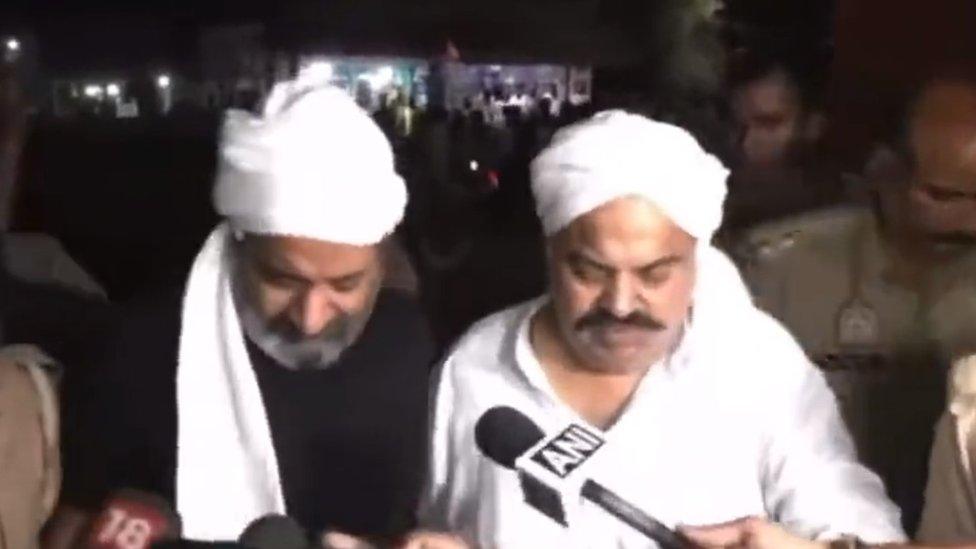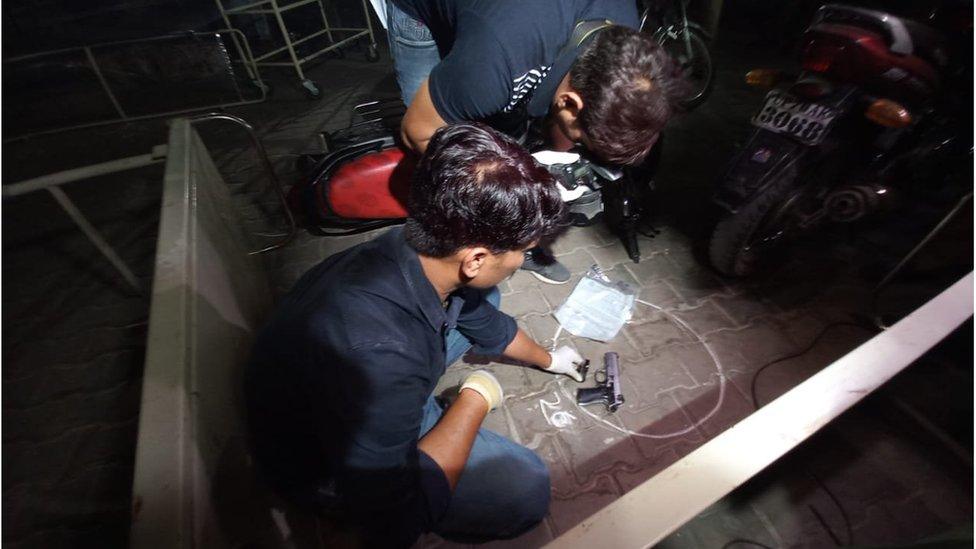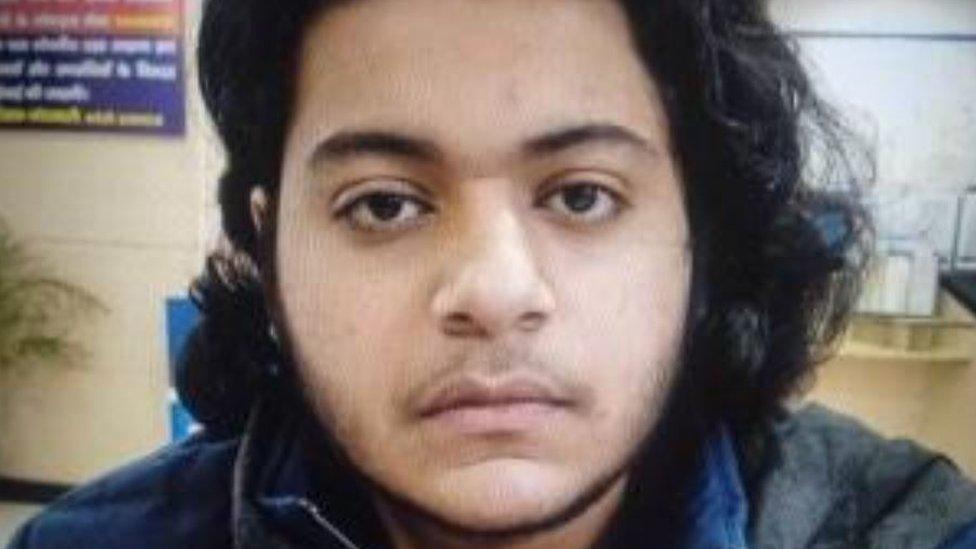Atiq Ahmed: The brazen murder of an Indian mafia don-turned-politician
- Published

Atiq Ahmed (right) and his brother Ashraf taking questions from journalists moments before their death
It was all over in less than a minute.
Footage from Saturday night shows mafia don-turned-politician Atiq Ahmed getting out from the back of a police jeep near a hospital in the city of Prayagraj, also known as Allahabad.
A heavyset man, Ahmed, a former MP and convicted criminal, is helped down by a policeman and his brother Ashraf. The brothers are being led by a chain attached to their handcuffs.
As they start walking, surrounded by a ring of police constables, local TV reporters besiege them - among them are gunmen pretending to be journalists.
A second later, a gun is pulled close to his head, his white turban detaches from his head as he collapses to the ground. A moment later, his brother is also shot.
Watch: Moments before former Indian MP Atiq Ahmed is shot live on TV
Two gunmen and another man immediately surrender to the police.
The Uttar Pradesh state government has ordered an investigation, but Saturday evening's daring murder has unleashed a torrent of criticism from major local and national politicians who say it shows law and order has broken down there.
Lawyer and politician Kapil Sibal said there had been "two murders, external" in Uttar Pradesh - "one, of Atiq and brother Ashraf and two, of Rule of Law".
Vikram Singh, former director general of Uttar Pradesh's state police, told the BBC that Ahmad's murder was unacceptable. "Death in custody is bad enough, murder is worse," he said.

A forensic team examined the spot where the Ahmed brothers were killed
To say Ahmed was a controversial man is an understatement.
The 60-year-old was born in a poor family in Prayagraj and was a school dropout, but over the years he amassed huge wealth, enjoyed political patronage and power and came to wield immense influence in the city of his birth and beyond.
Starting in 1989, he was elected five times as a legislator to the state assembly from the city, and was also elected to the parliament from Phulpur constituency in 2004.
Mr Singh describes him as a sort of "Robin Hood, a Dr Jekyll and Mr Hyde type of character" who "spent lavishly to help poor people - paying for weddings, giving them money during Eid festivals, and helping poor women buy school uniforms and books for their children".
But this persona unravelled as Ahmed was accused of kidnappings, murders, extortion and land grabs.
More than 100 cases were registered against him and he was said to be involved in as many more "but the victims were too afraid to lodge complaints", he added.
Over two decades Ahmed had spells in prison but but he maintained his sway, external over Uttar Pradesh's underworld and ensured his men were protected.
But after the regional Samajwadi Party severed ties with him and the Hindu nationalist Bharatiya Janata Party came to power in the state that Ahmed's influence began to wane.
He was arrested for assault in 2017 and was later moved to a prison in the western state of Gujarat.
The most recent action against him started in February when footage emerged that showed a group of men killing Umesh Pal, a key witness in the 2005 murder of Raju Pal, a lawmaker belonging to the regional Bahujan Samaj Party. The Ahmed brothers had been accused of involvement in Pal's murder.
The February murder caught on video set in motion a chain of events that has left Ahmed and several members of his family and supporters dead, his wife on the run with a bounty on her head, two of his sons in jail and the remaining two sons who are minors in government protection homes.
Ahmed was brought to Prayagraj to face charges in the case after India's Supreme Court last month declined to hear his petition alleging that there was a threat to his life from the police. His brother was also brought to the city from a prison in another district in the state.
On Thursday, his 19-year-old son Asad and an aide were killed by the police in a so-called encounter - with accusations flying that they were shot dead in a planned execution.
Many parts of Prayagraj were a ghost town on Sunday morning. The main bazaars in the old city - usually buzzing with activity at this time of the year as Muslims celebrate the festival of Eid - were deserted.
Police vans and officers are deployed on almost every street. Internet services are down in most parts. And locals are reluctant to talk to the media or say anything about the murders.

Asad, Atiq Ahmed's teenaged son, was killed by the police on Thursday
A 40-year-old Muslim man, who didn't want to be named, told the BBC that people were shocked.
"How can somebody be killed in front of the media and the police? He was a convicted criminal I agree, but that doesn't mean he can be shot like that. What about the rule of law?" he asked.
"Many of us are wondering if he was killed because he was a Muslim. I don't know if that's true, but this incident has terrified the city. We deserve better."
Mahant Raju Das, head of Hanumangadhi temple in the town of Ayodhya, however, said that such incidents should not be looked at through a sectarian lens.
"Criminals do not have religion or caste. I appeal to all politicians to not look at crime through a Hindu-Muslim lens," he said, adding that "it is a regrettable incident and raises questions on law and order situation in the state".
"There are still so many mafias in the state. But they should not be killed like this, they should be kept in jail so they should realise their sins."
Additional reporting by Ankit Srinivas from Prayagraj
BBC News India is now on YouTube. Click here, external to subscribe and watch our documentaries, explainers and features.